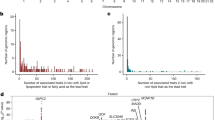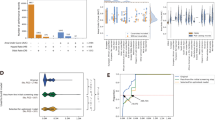Abstract
Genetic markers displaying highly significant statistical associations with complex phenotypes may not necessarily possess sufficient clinical validity to be useful. Understanding the contribution of these markers beyond readily available clinical biomarkers is particularly important in pharmacogenetics. We demonstrate the utility of genetic testing using the example of warfarin in a multi-ethnic setting comprising of three Asian populations that are broadly representative of the genetic diversity for half of the population in the world, especially as distinct interethnic differences in warfarin dose requirements have been previously established. We confirmed the roles of three well-established loci (CYP2C9, VKORC1 and CYP4F2) in explaining warfarin dosage variation in the three Asian populations. In addition, we assessed the relationship between ethnicity and the genotypes of these loci, observing strong correlations at VKORC1 and CYP4F2. Subsequently, we established the additional utility of these genetic factors in predicting warfarin dose beyond ethnicity and clinical biomarkers through performing a series of systematic cross-validation analyses of the relative predictive accuracies of various fixed-dose regimen, clinical and genetic models. Through a pharmacogenetics model for warfarin, we show the importance of genetic testing beyond readily available clinical biomarkers in predicting dose requirements, confirming the role of genetic profiling in personalized medicine.
This is a preview of subscription content, access via your institution
Access options
Subscribe to this journal
Receive 6 print issues and online access
$259.00 per year
only $43.17 per issue
Buy this article
- Purchase on Springer Link
- Instant access to full article PDF
Prices may be subject to local taxes which are calculated during checkout

Similar content being viewed by others
References
Kraft P, Wacholder S, Cornelis MC, Hu FB, Hayes RB, Thomas G et al. Beyond odds ratios—communicating disease risk based on genetic profiles. Nat Rev Genet 2009; 10: 264–269.
Jakobsdottir J, Gorin MB, Conley YP, Ferrell RE, Weeks DE . Interpretation of genetic association studies: markers with replicated highly significant odds ratios may be poor classifiers. PLoS Genet 2009; 5: e1000337.
Kattan MW . Judging new markers by their ability to improve predictive accuracy. J Natl Cancer Inst 2003; 95: 634–635.
Talmud PJ, Hingorani AD, Cooper JA, Marmot MG, Brunner EJ, Kumari M et al. Utility of genetic and non-genetic risk factors in prediction of type 2 diabetes: Whitehall II prospective cohort study. BMJ 2010; 340: b4838.
Pharoah PD, Antoniou AC, Easton DF, Ponder BA . Polygenes, risk prediction, and targeted prevention of breast cancer. N Engl J Med 2008; 358: 2796–2803.
Nebert DW, Zhang G, Vesell ES . From human genetics and genomics to pharmacogenetics and pharmacogenomics: past lessons, future directions. Drug Metab Rev 2008; 40: 187–224.
Daly AK . Genome-wide association studies in pharmacogenomics. Nat Rev Genet 2010; 11: 241–246.
Lesko LJ, Zineh I . DNA, drugs and chariots: on a decade of pharmacogenomics at the US FDA. Pharmacogenomics 2010; 11: 507–512.
Ansell J, Hirsh J, Hylek E, Jacobson A, Crowther M, Palareti G . Pharmacology and management of the vitamin K antagonists: American College of Chest Physicians evidence-based clinical practice guidelines (8th Edition). Chest 2008; 133 (6 Suppl): 160S–198S.
Aithal GP, Day CP, Kesteven PJ, Daly AK . Association of polymorphisms in the cytochrome P450 CYP2C9 with warfarin dose requirement and risk of bleeding complications. Lancet 1999; 353: 717–719.
Wadelius M, Sörlin K, Wallerman O, Karlsson J, Yue QY, Magnusson PK et al. Warfarin sensitivity related to CYP2C9, CYP3A5, ABCB1 (MDR1) and other factors. Pharmacogenomics J 2004; 4: 40–48.
Wadelius M, Chen LY, Downes K, Ghori J, Hunt S, Eriksson N et al. Common VKORC1 and GGCX polymorphisms associated with warfarin dose. Pharmacogenomics J 2005; 5: 262–270.
Rieder MJ, Reiner AP, Gage BF, Nickerson DA, Eby CS, McLeod HL et al. Effect of VKORC1 haplotypes on transcriptional regulation and warfarin dose. N Engl J Med 2005; 352: 2285–2293.
Zhao F, Loke C, Rankin SC, Guo JY, Lee HS, Wu TS et al. Novel CYP2C9 genetic variants in Asian subjects and their influence on maintenance warfarin dose. Clin Pharmacol Ther 2004; 76: 210–219.
Lee SC, Ng SS, Oldenburg J, Chong PY, Rost S, Guo JY et al. Interethnic variability of warfarin maintenance requirement is explained by VKORC1 genotype in an Asian population. Clin Pharmacol Ther 2006; 79: 197–205.
Tham LS, Goh BC, Nafziger A, Guo JY, Wang LZ, Soong R et al. A warfarin-dosing model in Asians that uses single-nucleotide polymorphisms in vitamin K epoxide reductase complex and cytochrome P450 2C9. Clin Pharmacol Ther 2006; 80: 346–355.
Caldwell MD, Awad T, Johnson JA, Gage BF, Falkowski M, Gardina P et al. CYP4F2 genetic variant alters required warfarin dose. Blood 2008; 111: 4106–4112.
Takeuchi F, McGinnis R, Bourgeois S, Barnes C, Eriksson N, Soranzo N et al. A genome-wide association study confirms VKORC1, CYP2C9, and CYP4F2 as principal genetic determinants of warfarin dose. PLoS Genet 2009; 5: e1000433.
Shikata E, Ieiri I, Ishiguro S, Aono H, Inoue K, Koide T et al. Association of pharmacokinetic (CYP2C9) and pharmacodynamic (factors II, VII, IX, and X; proteins S and C; and gamma-glutamyl carboxylase) gene variants with warfarin sensitivity. Blood 2004; 103: 2630–2635.
Wadelius M, Chen LY, Eriksson N, Bumpstead S, Ghori J, Wadelius C et al. Association of warfarin dose with genes involved in its action and metabolism. Hum Genet 2007; 121: 23–34.
Wang TL, Li HL, Tjong WY, Chen QS, Wu GS, Zhu HT et al. Genetic factors contribute to patient-specific warfarin dose for Han Chinese. Clin Chim Acta 2008; 396: 76–79.
Yuan HY, Chen JJ, Lee MT, Wung JC, Chen YF, Charng MJ et al. A novel functional VKORC1 promoter polymorphism is associated with inter-individual and inter-ethnic differences in warfarin sensitivity. Hum Mol Genet 2005; 14: 1745–1751.
Chen J, Teo YY, Toh DS, Sung C . Interethnic comparisons of important pharmacology genes using SNP databases: potential application to drug regulatory assessments. Pharmacogenomics 2010; 11: 1077–1094.
Teo YY, Sim X, Ong RT, Tan AK, Chen J, Tantoso E et al. Singapore Genome Variation Project: a haplotype map of three Southeast Asian populations. Genome Res 2009; 19: 2154–2162.
R: A language and environment for statistical computing. Available from: http://www.R-project.org.
The International Warfarin Pharmacogenetic Consortium. Estimation of the warfarin dose with clinical and pharmacogenetic data. N Engl J Med 2009; 360: 753–764.
Limdi NA, Wadelius M, Cavallari L, Eriksson N, Crawford DC, Lee MT et al. Warfarin pharmacogenetics: a single VKORC1 polymorphism is predictive of dose across 3 racial groups. Blood 2010; 115: 3827–3834.
Scott SA, Khasawneh R, Peter I, Kornreich R, Desnick RJ . Combined CYP2C9, VKORC1 and CYP4F2 frequencies among racial and ethnic groups. Pharmacogenomics 2010; 11: 781–791.
Sagreiya H, Berube C, Wen A, Ramakrishnan R, Mir A, Hamilton A et al. Extending and evaluating a warfarin dosing algorithm that includes CYP4F2 and pooled rare variants of CYP2C9. Pharmacogenet Genomics 2010; 20: 407–413.
Goldstein DB, Hirschhorn JN . In genetic control of disease, does ‘race’ matter? Nat Genet 2004; 36: 1243–1244.
Yen-Revollo JL, Auman JT, McLeod HL . Race does not explain genetic heterogeneity in pharmacogenomic pathways. Pharmacogenomics 2008; 9: 1639–1645.
Roper N, Storer B, Bona R, Fang M . Validation and comparison of pharmacogenetics-based warfarin dosing algorithms for application of pharmacogenetic testing. J Mol Diagn 2010; 12: 283–291.
Shaw PB, Donovan JL, Tran MT, Lemon SC, Burgwinkle P, Gore J . Accuracy assessment of pharmacogenetically predictive warfarin dosing algorithms in patients of an academic medical center anticoagulation clinic. J Thromb Thrombolysis 2010; 30: 220–225.
Acknowledgements
We thank the anonymous reviewers for their insightful comments and suggestions, which greatly improved the manuscript. SLC, CS, KSC and YYT acknowledge support from the Yong Loo Lin School of Medicine from the National University of Singapore. YYT is funded by the Singapore National Research Foundation (NRF-RF-2010-05).
Author information
Authors and Affiliations
Corresponding author
Ethics declarations
Competing interests
The authors declare no conflict of interest.
PowerPoint slides
Rights and permissions
About this article
Cite this article
Chan, S., Suo, C., Lee, S. et al. Translational aspects of genetic factors in the prediction of drug response variability: a case study of warfarin pharmacogenomics in a multi-ethnic cohort from Asia. Pharmacogenomics J 12, 312–318 (2012). https://doi.org/10.1038/tpj.2011.7
Received:
Revised:
Accepted:
Published:
Issue Date:
DOI: https://doi.org/10.1038/tpj.2011.7
Keywords
This article is cited by
-
Rates of genetic testing in patients prescribed drugs with pharmacogenomic information in FDA-approved labeling
The Pharmacogenomics Journal (2021)
-
Role of pharmacogenetics in public health and clinical health care: a SWOT analysis
European Journal of Human Genetics (2016)
-
Impact of the CYP4F2 p.V433M Polymorphism on Coumarin Dose Requirement: Systematic Review and Meta-Analysis
Clinical Pharmacology & Therapeutics (2012)



